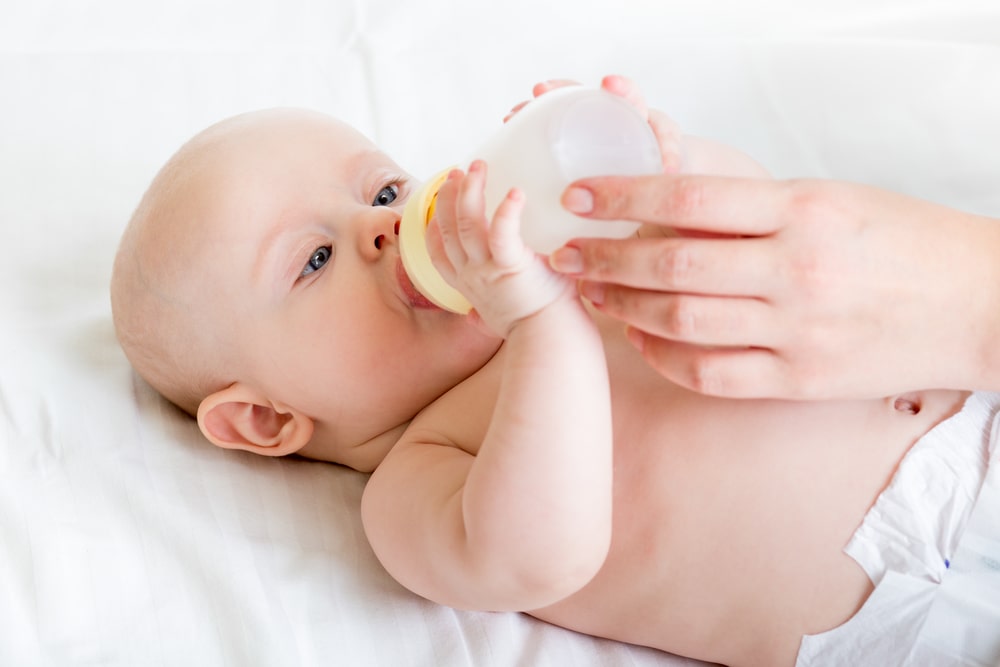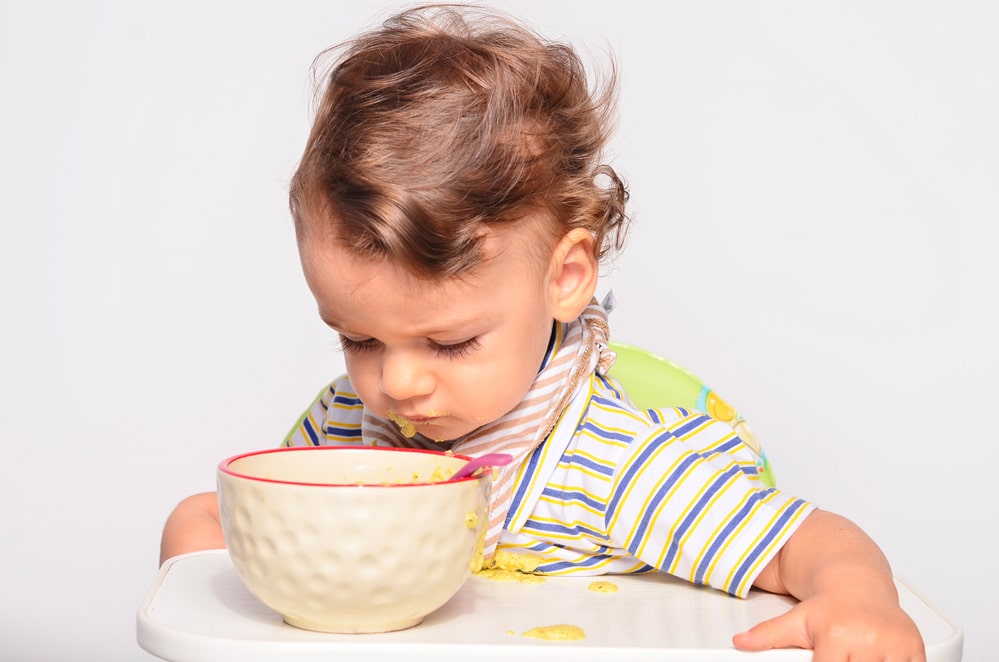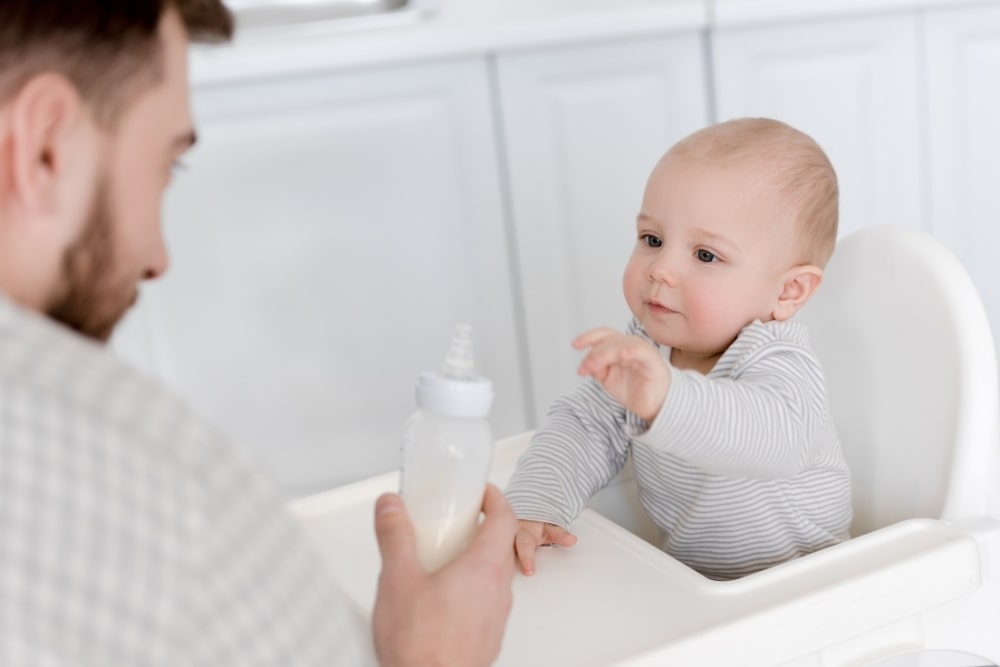Babies make all sorts of strange noises. Parents expect their baby’s to cry and make little cooing and babbling sounds, but it can be concerning when your baby’s tummy is gurgling and rumbling.
A baby’s stomach will often make lots of strange sounds and more often than not there is no need to worry.
Is It Normal For Baby’s Stomach To Rumble?
Think about your stomach, it’s not exactly silent, is it? You don’t panic every time your stomach grumbles and you shouldn’t be worried if your baby’s stomach is gurgling and rumbling.
It is perfectly normal for your baby’s stomach and digestive system to make all sorts of noises. You will notice the sounds more while your baby is a tiny newborn and their digestive system is still growing and developing.
The only time you would need to be concerned is if your baby was acting as though they were in pain at the same time as their stomach is making a grumbling noise.
Also, if your baby is demonstrating other symptoms linked to their digestive system you may want to take them to an appointment with their pediatrician who will be able to investigate if the sounds and pain are linked.
What Causes Stomach Rumbling and Gurgling?
So, why is your baby’s stomach gurgling and making rumbling sounds? There are lots of reasons why babies get noisy bellies, many of which are just linked to the normal healthy function of their digestive system.
Here is a list of reasons why your baby’s stomach could be rumbling and gurgling:
They are hungry
Let’s talk about the most obvious reason first. Just like yours does when you are hungry, your baby’s stomach is gurgling and rumbling because they need to eat.
View in gallery
This is a problem that is easy to solve! If you start hearing your baby’s stomach rumble, they are probably showing other huger cues and it has been about two or three hours since they last ate, give your baby a feed and the rumbling should stop.
Stomachs rumble when we are hungry because they are empty. When a stomach is empty, the walls will contract and pushes air around the empty space. It is this moving air that causes the grumbling sound, as we fill our stomachs with food the rumbling will stop.
Your baby has gas
When your baby is eating, their stomach can sometimes continue to make strange sounds. The noises you hear are usually not their stomach at all but air and gas moving through their digestive tract.
As your baby drinks their milk, either through nursing or bottle-feeding, gas bubbles can be ingested and get caught or ‘trapped’ in the digestive system.
Sometimes your baby may cry during or after feeds while strange noises are coming from their body.
This gurgling accompanied by signs of discomfort is likely to just be trapped gas. Regularly burping your baby will help to move the trapped gas along, relieving the pain your baby is in.
They are not quite full
If you pick your baby up and you can hear a sloshing sound, chances are their stomach isn’t totally full.
If there is still space in your baby’s tummy when you move them or they move themselves into a different position, the liquid in their stomach will move around in the remaining space, resulting in a sometimes alarming sloshing noise.
Think of a ball full of water, if it’s full the liquid is packed too tightly to make much sound when you move the ball. However, if the ball is only half full there is plenty of space for the water to slosh and move around, making lots of noises as it does so.
Don’t panic if you hear this sloshing sound coming from your child’s stomach, it just means their milk is moving around in their stomach before it continues through their digestive system.
View in gallery
They need to change position
Babies, especially newborns, are not very mobile at all. If you lay a baby down in one position, chances are they are not going to be able to move much until you pick them up and reposition them.
Sometimes, your baby’s stomach gurgling is simply caused because gas and air bubbles that can not move through their intestine easily.
If your baby’s stomach is growling and gurgling, try changing its position. Some positions make it more difficult for gas to escape than others.
If you notice your newborn’s stomach gurgling while they are laying on their back, try putting them into a more upright position. Rest your baby up on your shoulder in an upright position and pat their back, this will encourage any trapped gas to escape and the gurgling sounds should stop.
They need to poop
The digestive system makes weird sounds all the time, at every stage. When we are hungry our stomachs rumble and growl, if we eat too fast our stomachs can gurgle and if we have a lot of liquid in our diet our bellies can make strange sloshing sounds.
As our food is digested we can hear strange grumbles as gas moves through our system and we all know about the noises that happen when it is time to head to the bathroom. The same goes for babies.
Your baby will release gas just like any adult and sometimes this passing of wind can be surprisingly loud for such a tiny human! Prior to filling their diaper with poop, you may hear your baby-making some grunting sounds and their bowel may be growling too.
They are having a reaction to something in their milk
If your baby is breastfed, stomach sounds could be linked to something you ate that hasn’t quite agreed with their tiny stomach. Just like us, adults can get an upset stomach from time to time, so can babies.
Perhaps you ate something spicy or introduced a completely new flavor or food into your diet and your baby’s stomach is having a hard time processing it.
View in gallery
Sometimes when we eat certain foods it can create more gas or cause digestion to not happen as easily as normal. Anything that interferes with healthy digestion can potentially cause grumbling and growling sounds.
If your baby’s stomach is growling and gurgling regularly after you have eaten certain foods, you may want to reduce or eliminate that particular food from your diet, especially if the stomach gurgles are accompanied by signs of discomfort, diarrhea, or vomiting.
If you notice your bottle-fed baby is having sickness and diarrhea, seems upset, uncomfortable, and has a gurgling stomach, you may need to consider changing their formula.
Not all formula milk companies use the same ingredients and if your baby is upset and their stomach gurgles a lot after feeds, they may be sensitive to a certain ingredient in the formula milk.
There are many different brands of formula and with the help of your pediatrician, you will be able to find one that doesn’t upset your baby’s stomach.
Baby Stomach Making Noises While Sleeping
Digestion is a noisy business and the stomach sounds don’t stop just because your baby is asleep. You may hear your baby’s stomach growling and gurgling asleep but this is no reason to be alarmed.
When your newborn baby is asleep on their back, the sounds you hear are likely to just be milk and gas moving through their digestive tract.
Your baby is eating and pooping around the clock. You know this, you are the one in charge of feeding them milk every two hours or so and changing all of those dirty diapers.
As your baby is eating and pooping so regularly, their digestive system is working 24/7 and doesn’t have a break when your baby decides it is time for some shut-eye.
If your baby’s stomach is gurgling while they are asleep, there is no cause for concern if they seem happy and healthy. As long as the digestive system is working you are going to hear some sounds, it is completely normal.
In fact, it is when you start to rarely hear any sound coming from your baby’s stomach that the alarm bells should start ringing. If you notice a reduction or change in the sounds coming from your baby’s tummy then you should contact a pediatrician for advice.
View in gallery
How Do You Soothe A Child’s Upset Stomach?
Sometimes infant stomach noises can be linked to an upset stomach. Your baby may have diarrhea, trapped gas, or colic. There are lots of common digestive issues in infants that can easily be solved at home. Here is a list of some ways you can alleviate your baby’s upset stomach:
Bicycle legs
Laying your baby on their back and moving their legs in a pedaling a bicycle motion can help to move trapped gas and encourage normal digestion.
Baby massage
If your baby’s stomach is gurgling and growling and they seem uncomfortable, you can try giving them a baby massage to ease the discomfort.
Lay your baby on their back, apply some baby oil to your fingers and move them in a clockwise motion around your baby’s abdomen. Massage can encourage gas to move through the digestive tract and has also been found to help with constipation.
Warm bath
A warm bath can help to ease the symptoms of an upset stomach. Warm water is a great remedy for aches and pains and can also help to encourage a bowel movement.
Bathing your baby will relax them emotionally but also relax the muscles in their body, making it easier for them to pass gas and it is not uncommon for babies to poop in the tub too.
Don’t put your baby down straight after feeding
If you lay a baby down immediately after feeding you increase the risk of gas and air bubbles getting trapped in their digestive system. Hold your baby upright or laying over your shoulder for as long as possible after feeds.
While your baby is in an upright position they are able to more easily digest their feed and there is less chance of gas getting trapped and causing them pain.
Burp your baby regularly
By regularly winding or burping your baby you will help them to release gas more easily and prevent it from getting stuck inside their body.
View in gallery
Sit your baby up or place them up over your shoulder and gently pat their back until they burp. Make sure you have a muslin cloth ready in case your baby decides to spit up on your shirt too!
Use colic drops or gripe water
You can purchase gas drops from the drug store that are specifically designed to help relieve the symptoms of colic and trapped gas. Gripe water can also help to move gas through your baby’s body and is safe to give to babies over two weeks of age.
When using any products to help with your baby’s upset stomach, make sure you read the dosage guidelines carefully and seek professional advice if you are unsure if a product is suitable for your baby.
[amalinkspro type=”showcase” asin=”B00DB4N08G” apilink=”https://www.amazon.com/dp/B00DB4N08G?tag=mominformedcom-20&linkCode=osi&th=1&psc=1″ new-window=”true” addtocart=”false” nofollow=”true” sc-id=”5″ img-sizes=”500:500″ imgs=”https://m.media-amazon.com/images/I/51DovlkBbhL._SL500_.jpg” link-imgs=”false” btn-color=”#ff9900″ btn-text=”Check Price” alignment=”aligncenter” hide-prime=”0″ hide-image=”0″ hide-price=”1″ hide-button=”0″ width=”400″]Little Remedies Gas Relief Drops for Tummy’s, Natural Berry, 0.5 oz[/amalinkspro]
The Final Thought
Baby’s stomachs are noisy even though they are tiny, it is a fact. If you notice your baby’s stomach gurgling or rumbling, this is rarely a reason to worry.
Stomachs make noises when they need food, intestines make noises when they digest food and bowels make noises when your baby is getting ready to fill their diaper. It is completely normal for your newborn’s stomach to make noises.
However, when stomach noises can be heard alongside your baby experiencing discomfort or pain, this may mean your little one has an upset stomach.
If your baby’s stomach noises are causing you concern and they are displaying other symptoms, seek help from a pediatrician who will be able to offer you professional advice.
On the whole, stomach noises are just another sound you will soon get used to hearing from your baby.






